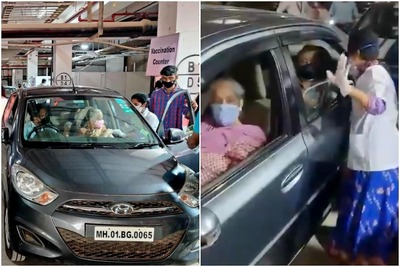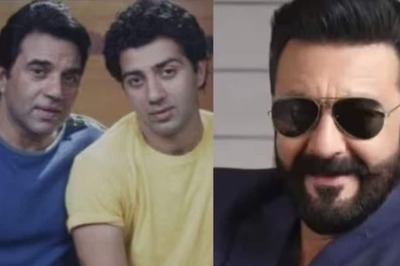
views
India makes about 2000 films year after year, and I watch many of them – some on streaming platforms like Amazon and Netflix. And it is always a dilemma to pick five most memorable ones. But I have given it a try, and here they are.
Karwaan:
Amazing that the debutant director, Akarash Khurana, handles a morbid subject like death and loss in a breezy, subtly humorous way in his Hindi-language Karwaan. With the story by Bijoy Nambiar, the film's trump card is Irrfan Khan -- who proves to be the soul and spirit of this road movie. Portraying Shaukat in his usual quiet, lighthearted but mesmeric manner (with some of the best lines), Khan steers his ramshackle van through the winding roads of southern India, criss-crossing the Blue Mountains, gurgling rivers and the picturesque Kerala landscape. But this hides an ominous tale: of a horrific accident on the Himalayas, and two dead bodies, each handed over to the wrong relative. Avinash (Dulquer Salman), who hates his father so much that he cannot even grieve his death, gets the body of Tanya’s (Mithila Palkar) grandmother. And the father’s corpse goes to Tanya’s family in Kerala. But in this tragic mess, Khurana weaves in moments and moments of mirth.
Manto:
Nandita Das’ second movie, Manto, in Hindi and Urdu, talks about the pain and pathos during India’s Partition and Independence from 1946 to 1950 through the eyes of one of the greatest writers of the subcontinent, Saadat Hasan Manto. Premiered at 2018 Cannes Film Festival, Manto was described to me by a friend and fellow journalist as the “Garam Hawa" of today’s times, a work made in early 1970s by MS Sathyu. The movie manages to stay clear of an overdose of emotionalism, though India’s Partition was an awfully painful process that uprooted thousands of men, women and children, often taking them away from what was their home for generations, taking them away from the familiar and the friendly. This is what Das gets out best in her latest work, and her protagonist, Manto, says time and again that he could never be the same if he were to leave his beloved Bombay. And that is where he grew up, where his father and mother and also his first son are buried. Bombay, for Manto, was the inspiration for some of the most powerful words that emerged from his pencil. He did not use a pen, though he was an avid collector of some of the most renowned brands of the writing instrument.
Madras Beats:
One of the finest works I saw at the 2018 Tokyo International Film Festival was Rajiv Menon's Madras Beats or Sarvam Thaala Mayam in Tamil. Madras Beats is not just a touching story, a melodious musical -- but has a message of enormous importance. It tells us that it is about time the classical Carnatic music – predominant in the southern parts of India -- emerges out of the well, and opens its mind to varied and modern influences. Also, this includes throwing the gates of this form open to communities other than upper caste Hindus. For far too long, this musical tradition has been the preserve of the Brahmins, who have been generally disinclined to allow other castes to enter this domain.
96:
Writer-director Prem Kumar's 96, also in Tamil, is a lovely movie – romantic and nostalgic, but which stays well within believable limits. With Vijay Sethupathi playing a travel photographer, he gets invited to a school reunion ( of a group of students who had passed out in 1996, hence the title), where he meets his school sweetheart, Trisha. Fate had separated them, and while she is married with a child and lives in Singapore, Sethupathi is single and still a virgin. Trisha is shocked to find him uninitiated in sex, and they spend a night together in Chennai. She is devastated to hear how life had played tricks on her, taking her away from one who just adored her. The film did remind me of a work like Richard Linklater's 1995 Before Sunrise, where a couple meet on a train in Austria and decide to spend a night together before parting. Sethupathi and Trisha do the same – though the circumstances for their meeting are different – and finally part. One of the most memorable movies I saw this year.
Mayurakshi:
One of the most moving works I have seen in recent months was Atanu Ghosh's Mayurakshi, a Bengali language title which competed at the recent second edition of the Singapore South Asian International Film Festival. With an absolutely superb star cast of Soumitra Chatterjee, Prasenjit Chatterjee and Indrani Haldar, Mayurakshi would have been miles ahead even before the camera had begun to roll. Casting is as important as a story and script are for a movie, and Ghosh had done well to get Soumitra, one of the world's best actors that Satyajit Ray discovered decades ago and cast him in several films. Prasenjit and Indrani are not far behind with their subtle and sensitive portrayals. And the plot draws you into a world of fading memory and disappearing bonds. What is more, Ghosh manages to keep his script away from emotional upheavals, and Mayurakshi turns out to be a study in restraint in the face of weakening ties and failing marriages.




















Comments
0 comment